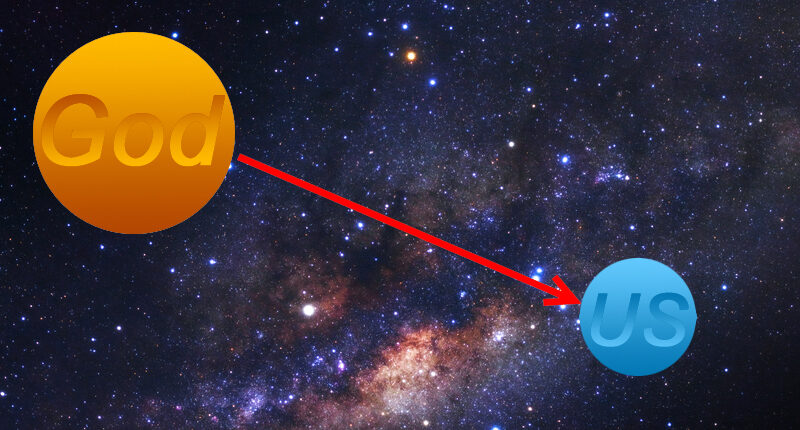Why Christianity?

Perhaps the most recognizable symbol of Christianity is a wooden cross. The cross symbolizes the manner of Jesus Christ’s death. It’s a reminder of the selfless love God has for us.
OK, so you might be ready to explore God and Religion. But why Christianity? There are many different religions with many different ideas about God and our origins. How do you begin to sort through the enormous amount of information? For example, Humanism and Hinduism are religions that even suggest you believe that all faiths (or paths) lead to God. They take a Smorgasbord approach to “picking” a religion.
Wait, what?! Where is truth in picking your own custom, human-derived religion?
Why should you explore Christianity as on track to the correct belief system? How do you know which religion and God is the true one? There is only one real story from God’s perspective. After all, if you invest your life into a belief system and change your lifestyle, you want to get it right.

The Bigger Picture
The case for Christianity is involved. We suggest zooming out and looking at the big picture before delving into details. Have you looked into these topics first?
- Introduction – We give you some food for thought about Religion.
- What is Religion? – We start with a universal understanding of what Religion is.
- A View From God’s Perspective – We can chase around trying to discover whose religion has the real God if we look at things from our perspective. A shift to looking at it from God’s perspective can help.
- Ancient World Religions – Studying some relevant things about the major religions can provide us with an understanding of how those religions approach who God is and His importance to the faith.
- Why is God Invisible? – We explain why the God we ask you to believe in is invisible.
- Why did God Create a Lower Dimension He Doesn’t Live In? – We look into why God would create us for interaction but not put us in the same environment He lives in.
- 4D Encounters in a 3D World – We go into some science that explains why God is invisible.
Human Perspective Versus God’s Perspective
We need a way to get at the truth with all of the religious and areligious philosophies and doctrines out there. After all, it is better to seek truth than traditions.
If we look at it from God’s perspective, there is a good possibility of being on track to the truth. We recommend you visit this link for a good overview of where we are taking this train of thought.
A different Tact is Necessary
We will spend a lot of time and likely get led off the trail to God if we do a deep-dive study into the minutia of all major (popular) and ancient religions. But if we look at the basic tenets of each religion to see if God reaches out to us, it will save time and eliminate off-track candidates.
Mission Statement
Our vision for this investigation then illustrates one arrow from God to us.
We need further study criteria for our investigation. So, we need criteria to learn God’s perspective. We won’t need to look in-depth at each religion. We can save that deep study for the religion that results from our investigation.

And if you want to verify the content of this website concerning other religions, or if you’re just curious about different religions, feel free to do an in-depth study of any of these religions. And if you know something we don’t or you find something we don’t consider on the website, comment on it or ask questions.
We want to facilitate discussion, so while we consider our content very important, we aren’t as interested in sharing our knowledge as hearing what you have to say. Being active listeners and hearing what you have to say are important to us.
We are upfront about our Christian perspective, and it’s in our logo. Our goal is to save time getting to the truth in setting criteria, not limit the flow of information.
Here Is What Makes Sense To Us
If this is all happenstance – none of this discussion about a creator makes sense. But if God created us, He had a purpose for His creation. We are free-willed, independent-thinking creations with life. That makes us interesting. Maybe this is arrogant; we don’t think so, but we believe our purpose is significant to the Creator. We assume God had interaction with us in mind when He created us.

If God created us for interaction, He would have wanted us to know that shortly after creating us. So, we would expect evidence of some form of communication from Him at the beginning of our appearance on earth. And we would expect that God would have initiated that interaction by reaching out to us instead of us having to search for Him.
We would expect that message to have withstood the test of time – that is, they would exist from the beginning and outward to every generation. That’s why, while there may be more obscure, time-forgotten, or localized religions since the beginning, we focus on the world’s foremost and ancient religions for possibly being the truth. People have followed them for a very long time – they aren’t going away, and people find them important for some reason. Make sense?
In exploring the major ancient religions, we find that only the Abrahamic faiths (e.g., Judaism, Christianity, and Islam) have the story of God reaching out to us from the beginning.
Islam came along millennium after the appearance of humans, and we find it difficult to believe God would have waited that long to give us the truth about our purpose. Therefore, we have set it aside as a possibility of leading to the truth.
More Likely Than Islam and Judaism – Christianity
That leaves Judaism and Christianity as suitable candidates. Christianity is an extension of Judaism and includes a historical man named Jesus, who was Jewish and claimed to be the Jewish Messiah. Christianity includes all of the Jewish beliefs. Some Jews also believe Jesus is the Messiah, but many more reject that idea and are still waiting for the Messiah.
We like Christianity because many things about Jesus mesh. Six hundred prophecies came true in Jesus, which is hard to ignore. The odds of that happening to one person in history are astronomical against it and are so close to impossible that the only way it could have occurred is if Jesus were who He said He was (and still is). Consider the fact that prophecies about Jesus spanned more than a thousand years, were written by many people, and every one of them has come to pass – if the prophecy has reached its time in history to happen. That’s more than coincidence.
Think of it. An actual, historical man whose life was prophesied, sometimes more than a thousand years before He was born, dwelled with us. His words, promises, and actions are so moving that they have echoed through the ages and are as relevant today as ever. He claimed He was God incarnate! How can that be ignored?! He could have come in our lifetime, in which case He would have looked us in the eye and told us that. It’s amazing! It actually happened! Let that sink in! A real person existed who said He was God and that everything in Scripture is true.
None of the other ancient world religions can make that claim. This is why we think Christianity is not only the most impactful and exciting religion to spend time exploring as the truth of our origins and God but also most likely the truth.
Truth Versus Traditions

This site quickly acknowledges that the kind of relationship Jesus taught when Agape love is applied is rare, even in Christian church settings. In the world we live in today, many domestic settings are more like social clubs. Unfortunately, this is why Jesus will turn many away at the Judgment. It’s what we term “Fallen World Christianity”.
Nonetheless, Christianity acknowledges Agape love (or selfless love) is the kind of relationship we should all be learning to practice, and those with sincerely held beliefs believe that the tenets of the Judeo-Christian Scriptures are true.
While many people are drawn to Christianity because they are genuinely searching for answers to the questions of life, others may come into it simply from tradition. Their ancestors were “Christian”, so they too are “Christian”. There is no underlying reason other than an inherited family label for this kind of “Christian”. It’s only a name and something to point to for a sense of belonging (e.g., the church you marry in and visit for religious holidays and the religious affiliation you claim on forms and polls). Faith isn’t seriously practiced in a traditionalist’s life. When philosophical controversy arises, it is likely that this kind of “Christian” will “go with the flow” rather than know what they believe and stand on that faith.
Traditionalists also attempt to meld their political and life philosophies with the tenets of the Christian faith. They end up with this human-derived conglomerate of philosophies that breaks down when they become controversial. No thought or consideration is given to ideas like the idea that God is real and He would have given us the story of our origins and purpose and expected us to live that out so we don’t face dire consequences. And building our own custom hybridized belief system has nothing to do with fact or reality. It becomes a distraction from important facts.
What Christianity Is
Christianity is…
- An ancient religion that shares the story of our origins with Judaism. Christianity is still popular today, withstanding the test of time. Many people have found truth in the tenets of the faith over millennia. Christianity has the power to change lives with truth and love.
- The incredible story of 600 prophecies, written over 1,500 years, about Jesus Christ. All of those prophecies have happened with 100% accuracy. Only future prophecies await fulfillment. It’s a signature from God stating that Jesus is God and He intended for Jesus to be here. It wouldn’t be called Christianity without Jesus Christ; it would be Judaism.
- Claiming that Jesus is God, Jesus said it Himself. No other ancient religion claims God visited us on earth besides Christianity. Jesus backs the claim that He’s God with miracles, signs, and wonders! Thousands of eyewitnesses attested to these things. It’s quite a testimony. He raised people from the dead!
- About Agape Love. Agape Love is selfless love. 1 Corinthians 13 in the Christian Bible describes Agape love. It “takes no account of a wrong suffered” but loves for Love’s sake. Jesus was the supreme example of Agape Love. He selflessly gave up his life at 33 years old to pay the cost of reconciling us back to Him (God). Christianity is about the selfless love of God.
- About a genuine, loving relationship. Everyone desires and seeks genuine relationships, as described in Christianity. Christianity practices that kind of relationship – when practiced as taught and exampled by Jesus.
- The way to have genuine, lasting Peace, Love, and Joy in your life. It is genuinely eternal when practiced in God’s way.
Further Investigation

Our Choice for further investigation: Christianity
Following our criteria for making it worthwhile to explore which religion might have the answer we are looking for, we conclude that Christianity is the best candidate. Judaism is included in that study.
That’s not just a bias, as you may suppose, from a Christianity-focused perspective. This is how many people have come to investigate and immerse themselves in Christianity. It’s a valid way to look at it.
Send your thoughts and questions on our view of Why Christianity
There are some good questions to ponder concerning this topic, and some good information to consider. You may have more great questions or comments we would welcome to proactively discuss respectfully. Fill out the form below, and we will consider it for discussion. You can also check out our blog to see if your question is already answered.
Powered by WordPress




